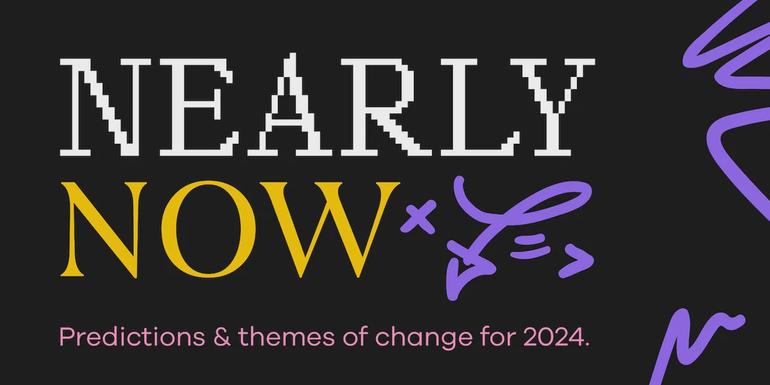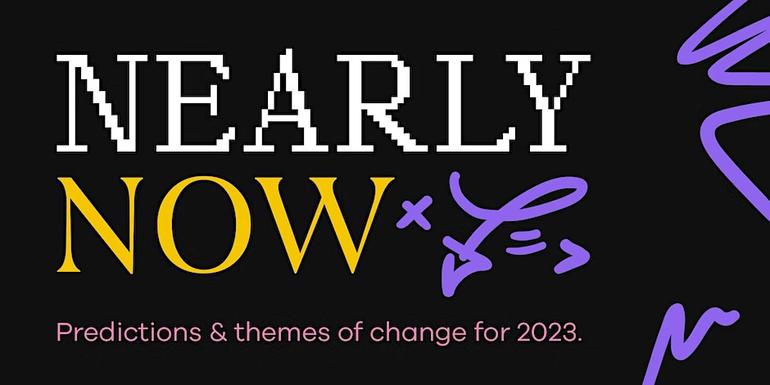
Faculty of Change 2020 Predictions
2020 Themes You Need to Know to Understand Global Change
Entering into 2020, no one is under the assumption it will be a smooth year. We at Faculty of Change are excited for the potential future. The picture has been painted for us by the signals of change we have been gathering on our own, and for our incredible forward-thinking clients.
We walk through the themes for 2020 in more depth below, but first, a few words about how to read them. These predictions are meant to be memorable, but also disposable. Use them to influence your decisions, not make them. They should be one of many factors you consider when setting short- and long-term strategy. For the others, feel free to reach out and set up a conversation.
Predictions are meant to be memorable, but also disposable.
Degrowth
Degrowth is likely to be the defining theme of the next 50 years. It is a political, economic, and social movement based on the idea that our world and our society can not sustain growth forever and that we actually need to shrink to be sustainable. Countries like Japan are known for their negative population growth, but countries like Germany and France are not far behind.

Degrowth is starting to inject itself into every conversation (not just the anti-consumerist and anti-capitalist ones). WeWork’s challenges and the return to Gross Margin are early versions of Growth at All Cost evolving to Sustainable Growth evolving to Sustainable Businesses. As the theorist Doug Rushkoff says, “The only thing that keeps growing at accelerating rates is cancer, and it kills its host.”
To be clear, Degrowth is not a worrying trend. It is a return to living within our means, be they financial, ecological or social.
Burnout
This is a meta prediction. Burnout is the consummation of trends like the rise of the precariat, millennial angst, and the prioritization self-care. Shifting the conversation to burnout highlights the fact that, for many, the mere act of existence has become tiring. We are starting to see major influencers shift their focus: for instance, Arianna Huffington is making combatting Burnout her mission. Meanwhile, consumers are self-medicating with meditation apps and face masks.
Corporations are going to start focusing on burnout in 2020 as a driver of economic risk. The traditional corporate approach of improving resilience through stress reduction and exercise will likely not be enough. What is needed is radical preventative interventions. Rethink the causes of burnout rather than just dealing with the symptoms. User will churn from things that demand their time and attention and will insulate themselves and create worlds with fewer triggers for burnout.
California Sober
This is one we are big fans of at Faculty of Change. The formal definition is someone who does not consume alcohol but still consumes cannabis or other “natural” drugs.
With the rise of health as status, trend-setting influencers are finding alcohol incompatible with their exercise and sleep schedules. Expect to see more low-alcohol or no-alcohol products in restaurants and bars (Seedlip and Verjus are making inroads in all the right places). Craft breweries are making light beer that is actually drinkable. “Exercise Beer,” which is supposedly formulated to be the perfect post-workout beverage, is a hot investment category. A major signal that this trend has hit the mainstream is Molson Coors removing brewing from their name.
Edutainment
Everyone feels and understands that the pace of change is constantly accelerating (we built a business around it. As a result, consumption of non-fiction or lightly fictionalized content has accelerated. Content creators are leaning into this, creating new formats and distribution channels to cater to our need to remain “in the loop.” Podcasts and Netflix documentaries will have big years. The Game Changers, a documentary on vegan athletes, will have an effect on eating habits in ways we have not seen since Temple Grandin.
Where this gets exciting is what kind of innovation we will see in the format in which the education content is delivered. The content has remained the same since books, but creators are coming up with newer and more interactive ways to share it. The Disney+ show “Forky Asks a Question” turns the complex into digestible, while podcasts like Hardcore History take the other route and offer multi-hour, Ken Burns-style, in-depth exploration of topics from the exciting to the mundane.
Aspirational Realness
If you live “in the timeline” this is something you feel and are surrounded by. Influencers are finding much higher engagement from sharing their “real” selves and issues. Through making themselves relatable, not purely aspirational, influencers are finding their content “hits different.” Do not be confused: this is not people being real, it is people being fake in different ways. As brands increasingly want to be a consumer’s friend, they are flocking to these influencers, who need to present a “real” version of themselves that conforms to the brand’s goals and objectives, especially as they relate to acquiring new users.

Realness will continue to define the consumer dichotomy. Some brands will choose to be your friend and others your goal. Outdoor Voices has risen to prominence by supporting “real people” while Lululemon continues its growth on the back of helping customers get better and look better (through its shapewear sold as athleisure products).
The Sound of the 80s
You would expect that music in 2020 would continue on the 90s nostalgia themes you are seeing elsewhere (Welcome back Celine Dion!!). Instead music from a decade earlier will continue its rise. There is a something about “Yacht Rock” that speaks to our times. The joy of the Twitter account People Dancing to Steely Dan, which superimposes Steely Dan songs over videos of people dancing, feels so current and relevant. Building on the rise of “Rose Wave” and “Sad Bangers” in 2017 and contemporary yacht rock like Carly Rae Jepsen, there is a growing nostalgia for music whose easy-listening nature hides a depth and mastery of song writing.

Yacht Rock is also a global phenomenon. You can see it in the rise of the prices of “City Pop” records on sites like Discogs. City Pop is a Japanese reinterpretation of American pop that started in the late 80s. Perfect dinner party music. A great place to get started is here.
Psychedelics
The legalization of marijuana has driven awareness of the impact that plant-based pharmaceuticals can have on individuals. Moving on from cannabis, expect to hear more about psilocybin (magic mushrooms) in 2020. Beyond clinical trials for uses like PTSD and depression, our favourite human guinea pigs (Silicon Valley Tech Bros) are anecdotally “micro dosing” mushrooms daily to reduce anxiety and increase creativity.
Beyond psilocybin, there is increased interest in other psychedelics. Venture funds that focus on commercial applications of LSD, MDMA, and the like are popping up like mushrooms after a rainfall. Investors and brands are plotting similar trajectories for psychedelics (which were legal until 1970) as cannabis, and hoping to be first in.
Premium Technology
The original promise of technology was that it would be democratic. The internet was supposed to open up the world. In 2020, we will see that access to the world closing off. Countries creating their own versions of the internet is nothing new; economic classes creating their own versions of the internet is. Benefits of technology that were originally free will be put behind paywalls. The most expensive iPhone 4 was $299 at release in 2010. The iPhone 11 Pro starts at 3x that!
Tools like Superhuman (the “premium” email client with a 200,000 person waiting list) are early signs of the creation of digital gated communities. As opposed to charging millions of users pennies, companies are now charging 1000s of users hundreds. This trend is dangerous because limiting the means of production to the elites will continue to accelerate growing societal inequality.
Looking forward to the year ahead! If you stuck with us till the end, you will want us to come and walk your teams through what to expect in 2020. Get in touch and we can work it out.


